A BRIEF HISTORY OF HOUSTON’S FUTURE HISTORIC PRESERVATION CULTURE  “Houston seems younger than it is,” writes Barry Moore today: “Few would guess that our founding by the Allen Brothers was within a few years of Chicago’s. Why does Chicago seem so much older? The answer is complex.” While the 70-year-old annual conference of the National Trust for Historic Preservation kicks off today in Houston for the first time, Moore charts decades of change in Houston’s laws, tax rules, and attitudes related to letting historic structures and places stick around. And Moore claims that these days, Houston’s out-with-the-old reputation “is itself a relic. Houston has turned a corner. After half a century of organizing, we now have a preservation culture and laws to protect parts of the built environment. This may be hard to believe, but I will argue that no other city in the country has such an opportunity to become ground zero for the future of the preservation movement.” [OffCite; previously on Swamplot] Photo of Astrodome: Russell Hancock via Swamplot Flickr Pool
“Houston seems younger than it is,” writes Barry Moore today: “Few would guess that our founding by the Allen Brothers was within a few years of Chicago’s. Why does Chicago seem so much older? The answer is complex.” While the 70-year-old annual conference of the National Trust for Historic Preservation kicks off today in Houston for the first time, Moore charts decades of change in Houston’s laws, tax rules, and attitudes related to letting historic structures and places stick around. And Moore claims that these days, Houston’s out-with-the-old reputation “is itself a relic. Houston has turned a corner. After half a century of organizing, we now have a preservation culture and laws to protect parts of the built environment. This may be hard to believe, but I will argue that no other city in the country has such an opportunity to become ground zero for the future of the preservation movement.” [OffCite; previously on Swamplot] Photo of Astrodome: Russell Hancock via Swamplot Flickr Pool
Tag: Ordinances
HEIGHTS DRY ZONE SIGNATURE GATHERERS RETURN FROM THE HUNT VICTORIOUS  Reports comes from both NextDoor and The Heights Life blog that the H-E-B-backed Houston Heights Beverage Coalition has collected the signatures it needs to trigger a local election over legalizing carry-out beer and wine sales in the Heights dry zone. The petition was officially issued in mid-May, at which point the 60-day collection clock started ticking; the group claimed they needed 1,500 signatures to meet the required threshold of 35 percent of the population living in the zone. [Previously on Swamplot] Photo of TABC regional headquarters at 427 W. 20th St.: LoopNet
Reports comes from both NextDoor and The Heights Life blog that the H-E-B-backed Houston Heights Beverage Coalition has collected the signatures it needs to trigger a local election over legalizing carry-out beer and wine sales in the Heights dry zone. The petition was officially issued in mid-May, at which point the 60-day collection clock started ticking; the group claimed they needed 1,500 signatures to meet the required threshold of 35 percent of the population living in the zone. [Previously on Swamplot] Photo of TABC regional headquarters at 427 W. 20th St.: LoopNet
NEED SOME HELP WITH THOSE 268,942 MAPPED HOUSTON PARKING TICKETS? 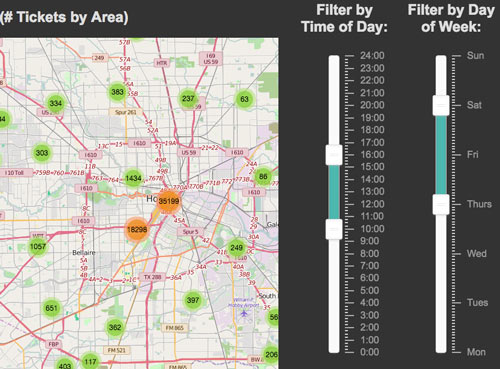 Amateur parking violation scrutinizer Jordan Poles has another new tool for those interested in the where- and when-abouts of parking citations in Houston. Each ticket from the same data set used in Poles’s earlier heat maps is now mapped individually (though thick clusters condense to single group markers at most zoom levels, since there are hundreds of thousands of tickets in the 2014-2016 dataset he uses). So far, the page lets users filter the tickets by time of day (sliders allow any hour-to-hour subdivision of a midnight-to-midnight window) and day of week (running Monday-through-Sunday); Poles plans to keep upgrading the site and to add new analytical features and datasets. [Previously on Swamplot] Image: HOU Interactive Parking Ticket Map
Amateur parking violation scrutinizer Jordan Poles has another new tool for those interested in the where- and when-abouts of parking citations in Houston. Each ticket from the same data set used in Poles’s earlier heat maps is now mapped individually (though thick clusters condense to single group markers at most zoom levels, since there are hundreds of thousands of tickets in the 2014-2016 dataset he uses). So far, the page lets users filter the tickets by time of day (sliders allow any hour-to-hour subdivision of a midnight-to-midnight window) and day of week (running Monday-through-Sunday); Poles plans to keep upgrading the site and to add new analytical features and datasets. [Previously on Swamplot] Image: HOU Interactive Parking Ticket Map
COMMENT OF THE DAY: WHY THINGS LITERALLY LOOK BRIGHTER ON HOUSTON’S HORIZONS  “Actually, Houston has substantially improved both air and water quality in the past few decades. I remember the haze days back in the early 90’s when you could not see more than a few miles through the smog when driving down the Katy Freeway, nor could you see the tops of the taller buildings. Also, nearly all of the illegal water pollution sources have been permitted and/or rerouted into treatment systems. The ones that haven’t are eventually caught and have to pay hefty fines, or the responsible people go to jail. It is true that much of the improvement was driven by federal and state regulation that trickled down to Houston, but that is true for most major cities.” [Superdave, commenting on Comment of the Day: Making Sure the House Wins Houston’s Toxicity Gamble] Illustration: Lulu
“Actually, Houston has substantially improved both air and water quality in the past few decades. I remember the haze days back in the early 90’s when you could not see more than a few miles through the smog when driving down the Katy Freeway, nor could you see the tops of the taller buildings. Also, nearly all of the illegal water pollution sources have been permitted and/or rerouted into treatment systems. The ones that haven’t are eventually caught and have to pay hefty fines, or the responsible people go to jail. It is true that much of the improvement was driven by federal and state regulation that trickled down to Houston, but that is true for most major cities.” [Superdave, commenting on Comment of the Day: Making Sure the House Wins Houston’s Toxicity Gamble] Illustration: Lulu
COMMENT OF THE DAY: EXCAVATING ELECTION PROCEDURES IN THE LOST CITY OF HOUSTON HEIGHTS 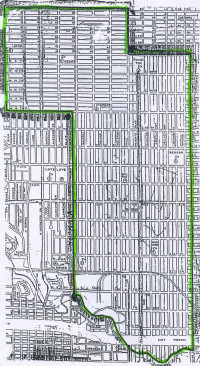 “OK, here’s where things get complicated. The current Alcoholic Beverage Code and Texas election law only provide for the possibility of holding a local option election in a county, municipality or JP precinct. It is therefore not clear that the application for a petition can be accepted as written, since the ‘area formerly known as the city of Houston Heights’ is none of those things. To complicate matters further, if the application were re-submitted as covering Harris County Precinct 1 (which covers the entirety of the dry area), it may still not resolve the matter. Current law essentially says that, for the purposes of local option elections, the vote of a justice precinct doesn’t prevail over the vote of a city, independent of date of election. So the 1918 prohibition election would trump the 2016 local option election. There’s a reasonable reading of this that indicates the only way to allow alcohol sales in the dry Heights is a local option election for the entire city of Houston. Since petitions require a number of signatures exceeding 25 percent of the votes cast in the last general election, the petitioners would need many more signatures than there are actual residents of the affected area. Good luck with that.” [Angostura, commenting on Somebody’s Trying to Legalize Beer and Wine Sales in the Heights Dry Zone] Map of Heights Dry Zone: HoustonHeights.org
“OK, here’s where things get complicated. The current Alcoholic Beverage Code and Texas election law only provide for the possibility of holding a local option election in a county, municipality or JP precinct. It is therefore not clear that the application for a petition can be accepted as written, since the ‘area formerly known as the city of Houston Heights’ is none of those things. To complicate matters further, if the application were re-submitted as covering Harris County Precinct 1 (which covers the entirety of the dry area), it may still not resolve the matter. Current law essentially says that, for the purposes of local option elections, the vote of a justice precinct doesn’t prevail over the vote of a city, independent of date of election. So the 1918 prohibition election would trump the 2016 local option election. There’s a reasonable reading of this that indicates the only way to allow alcohol sales in the dry Heights is a local option election for the entire city of Houston. Since petitions require a number of signatures exceeding 25 percent of the votes cast in the last general election, the petitioners would need many more signatures than there are actual residents of the affected area. Good luck with that.” [Angostura, commenting on Somebody’s Trying to Legalize Beer and Wine Sales in the Heights Dry Zone] Map of Heights Dry Zone: HoustonHeights.org
ORDINANCE OPENING CHECKBOOKS, NOT SPACES 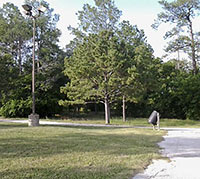 How much new parkland has the city acquired since 2007, when it passed the so-called open space ordinance meant to encourage residential developers to donate part of their properties to the public? “Not one acre,” reports the Houston Chronicle. Almost all the developers, reports Jayme Fraser, have “written checks” instead. But the city hasn’t spent the $11 million it has garnered in fees to buy land; much of it, rather, has gone to maintain and add amenities to the parks it already has: “Mark Ross, deputy director of parks development, said neighborhoods often want upgrades that can be easier to fund, such as . . . [a] playground and water fountains . . . . ‘Most of these might be considered minor improvements, but it’s what people appreciate the most,’ Ross said, pointing to 28 projects completed.” [Houston Chronicle ($)] Photo of Mason Park: Jose Luna
How much new parkland has the city acquired since 2007, when it passed the so-called open space ordinance meant to encourage residential developers to donate part of their properties to the public? “Not one acre,” reports the Houston Chronicle. Almost all the developers, reports Jayme Fraser, have “written checks” instead. But the city hasn’t spent the $11 million it has garnered in fees to buy land; much of it, rather, has gone to maintain and add amenities to the parks it already has: “Mark Ross, deputy director of parks development, said neighborhoods often want upgrades that can be easier to fund, such as . . . [a] playground and water fountains . . . . ‘Most of these might be considered minor improvements, but it’s what people appreciate the most,’ Ross said, pointing to 28 projects completed.” [Houston Chronicle ($)] Photo of Mason Park: Jose Luna
COMMENT OF THE DAY: THE LITTLE RULE HOUSTON STRIP-CENTER DEVELOPERS FORGOT  “Setback is from edge of right-of-way, not edge of pavement. The original building was on the lot line.
Chapter 42 allows for buildings lines of 5′ (even 0′ in some cases) for commercial developments with parking in rear. See 42-154.
Diagrams here and here.” [Angostura, commenting on The Retail That’s Replacing the Razed Heights Baptist Temple Buildings] Illustration: Lulu
“Setback is from edge of right-of-way, not edge of pavement. The original building was on the lot line.
Chapter 42 allows for buildings lines of 5′ (even 0′ in some cases) for commercial developments with parking in rear. See 42-154.
Diagrams here and here.” [Angostura, commenting on The Retail That’s Replacing the Razed Heights Baptist Temple Buildings] Illustration: Lulu
COMMENT OF THE DAY: WHY THERE’S NO ‘PARKING IN BACK’ REQUIREMENT  “The idea of requiring on-site parking to be put somewhere else beside the primary frontage along the street was considered during the Urban Corridors process (that led to the current Transit Corridor ordinance). The message from the development community was loud and clear: you cannot prohibit front-door parking within a certain area — that makes properties just outside the boundary of the restriction more valuable and attractive to a greater range of potential occupants, and therefore unfairly diminishes the value of the restricted properties. The idea of making such a restriction mandatory was thus scrapped; it is now an ‘opt-in’ feature of the ordinance in return for the ability to do a reduced setback. Only on streets in light rail corridors though — it doesn’t apply in places like Washington and Rice Village, sadly.” [Local Planner, commenting on Comment of the Day: Too Many Parking Spaces] Illustration: Lulu
“The idea of requiring on-site parking to be put somewhere else beside the primary frontage along the street was considered during the Urban Corridors process (that led to the current Transit Corridor ordinance). The message from the development community was loud and clear: you cannot prohibit front-door parking within a certain area — that makes properties just outside the boundary of the restriction more valuable and attractive to a greater range of potential occupants, and therefore unfairly diminishes the value of the restricted properties. The idea of making such a restriction mandatory was thus scrapped; it is now an ‘opt-in’ feature of the ordinance in return for the ability to do a reduced setback. Only on streets in light rail corridors though — it doesn’t apply in places like Washington and Rice Village, sadly.” [Local Planner, commenting on Comment of the Day: Too Many Parking Spaces] Illustration: Lulu
ORDINANCE NOW PROTECTS THE VULNERABLE FROM PASSING CARS, PROJECTILES  Yesterday, city council approved an ordinance requiring Houston drivers to play nicer with others. That means: No throwing things at them anymore, and no passing “vulnerable road users” without maintaining at least 3 ft. of space (or 6 ft., if you’re driving a commercial truck). And how are you supposed to know which road user is vulnerable? Maybe you can print out and keep in your car this list — not organized, presumably, by order of importance —Â from the city press release: “walkers or runners; the physically disabled, such as someone in a wheelchair; a stranded motorist or passengers; highway construction, utility or maintenance workers; tow truck operators; cyclists; moped, motor-driven cycle and scooter drivers; or horseback riders.” [City of Houston] Photo of cyclists on Fry Rd.: Flickr user josephkynguyen
Yesterday, city council approved an ordinance requiring Houston drivers to play nicer with others. That means: No throwing things at them anymore, and no passing “vulnerable road users” without maintaining at least 3 ft. of space (or 6 ft., if you’re driving a commercial truck). And how are you supposed to know which road user is vulnerable? Maybe you can print out and keep in your car this list — not organized, presumably, by order of importance —Â from the city press release: “walkers or runners; the physically disabled, such as someone in a wheelchair; a stranded motorist or passengers; highway construction, utility or maintenance workers; tow truck operators; cyclists; moped, motor-driven cycle and scooter drivers; or horseback riders.” [City of Houston] Photo of cyclists on Fry Rd.: Flickr user josephkynguyen
MAYOR PARKER INTENDS TO BAN TEXTING AND DRIVING IN HOUSTON 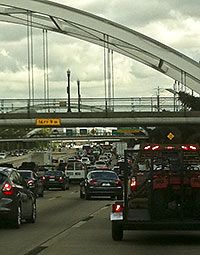 If the bill that would outlaw texting and driving statewide, vetoed 2 years ago by Governor Perry, doesn’t catch on this time around, Mayor Parker says she will move to ban the act in Houston: A press release today says that the mayor’s “Houston, It Can Wait” campaign, part of a national push to limit texting-induced accidents and fatalities, “will be guided by a task force consisting of representatives of law enforcement, government, education, corporate, medical, professional and faith-based organizations.” And it appears that Mayor Parker intends to use another local resource to help her get the word out: “Several entities . . . have agreed to broadcast a public service announcement featuring Mayor Parker and rapper Bun B.” [City of Houston] Photo of Southwest Fwy.: Flickr user KreinikGirl
If the bill that would outlaw texting and driving statewide, vetoed 2 years ago by Governor Perry, doesn’t catch on this time around, Mayor Parker says she will move to ban the act in Houston: A press release today says that the mayor’s “Houston, It Can Wait” campaign, part of a national push to limit texting-induced accidents and fatalities, “will be guided by a task force consisting of representatives of law enforcement, government, education, corporate, medical, professional and faith-based organizations.” And it appears that Mayor Parker intends to use another local resource to help her get the word out: “Several entities . . . have agreed to broadcast a public service announcement featuring Mayor Parker and rapper Bun B.” [City of Houston] Photo of Southwest Fwy.: Flickr user KreinikGirl
MAYOR PARKER ASKS CITY COUNCIL TO DECRIMINALIZE DIVING IN PUBLIC DUMPSTERS  A Houston man’s arrest for Dumpster diving outside City Hall was news to Mayor Parker: “And I had to say, really?” says the mayor in teevee reporter Doug Miller’s story. “There’s an ordinance for that? Give me a break.” And Mayor Parker has since requested that city council revise the 1942 ordinance that criminalizes rummaging: Lawyers who want to see it repealed, reports the Houston Chronicle’s Mike Morris, say that the ordinance “adversely impacts homeless persons and absorbs law enforcement time that could otherwise be spent preventing more significant criminal activity.” But, reports Morris, potential changes won’t mean Houstonians will be free to help themselves to whatever and wherever they’d like: “[S]pokeswoman Janice Evans said the proposed repeal will be amended . . . to ensure that it only addresses the situation which saw [the man] cited for picking through a public trash can. Rummaging through trash cans or recycling bins at homes and businesses still will not be allowed . . . .” [KHOU; Houston Chronicle] Photo of Dumpster: Flickr user nicksaltman
A Houston man’s arrest for Dumpster diving outside City Hall was news to Mayor Parker: “And I had to say, really?” says the mayor in teevee reporter Doug Miller’s story. “There’s an ordinance for that? Give me a break.” And Mayor Parker has since requested that city council revise the 1942 ordinance that criminalizes rummaging: Lawyers who want to see it repealed, reports the Houston Chronicle’s Mike Morris, say that the ordinance “adversely impacts homeless persons and absorbs law enforcement time that could otherwise be spent preventing more significant criminal activity.” But, reports Morris, potential changes won’t mean Houstonians will be free to help themselves to whatever and wherever they’d like: “[S]pokeswoman Janice Evans said the proposed repeal will be amended . . . to ensure that it only addresses the situation which saw [the man] cited for picking through a public trash can. Rummaging through trash cans or recycling bins at homes and businesses still will not be allowed . . . .” [KHOU; Houston Chronicle] Photo of Dumpster: Flickr user nicksaltman
CHANGES COMING TO OFF-STREET PARKING IN HOUSTON 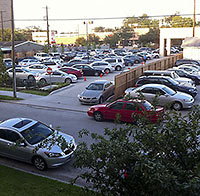 City council approved today by a vote of 14-2 changes to the off-street parking ordinance that hasn’t really been tweaked since 1989. The changes, reports the Houston Chronicle’s Mike Morris, will remove one-size-fits-all requirements that seem to have been rankling smaller bars and restaurants — and their support groups like OKRA — inside the Loop: “The ordinance loosens rules on how close parking lots must be to a building’s front door, makes it easier for businesses to share parking, allows substitution of bike parking for car spaces, cuts parking for historic buildings and allows the creation of “special parking areas” so neighborhoods can create new rules tailored to their needs.” [Houston Chronicle; previously on Swamplot] Photo of parking lot behind Tony Mandola’s Gulf Coast Kitchen: Swamplot inbox
City council approved today by a vote of 14-2 changes to the off-street parking ordinance that hasn’t really been tweaked since 1989. The changes, reports the Houston Chronicle’s Mike Morris, will remove one-size-fits-all requirements that seem to have been rankling smaller bars and restaurants — and their support groups like OKRA — inside the Loop: “The ordinance loosens rules on how close parking lots must be to a building’s front door, makes it easier for businesses to share parking, allows substitution of bike parking for car spaces, cuts parking for historic buildings and allows the creation of “special parking areas” so neighborhoods can create new rules tailored to their needs.” [Houston Chronicle; previously on Swamplot] Photo of parking lot behind Tony Mandola’s Gulf Coast Kitchen: Swamplot inbox
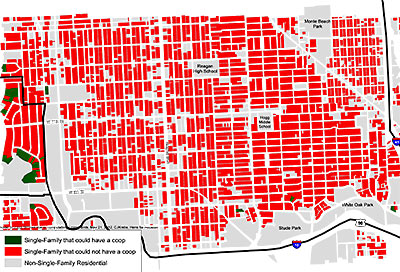
In Dallas, you have to keep at least 20 ft. between your chicken coop and your neighbor’s stuff. Here? It’s 100 ft. That’s why this map of the Greater Heights looks the way it does. Hens for Houston founder Claire Krebs, using GIS technology she learned as an engineering student at Rice, created a series of these maps (what she’s calling “policy-making tools”) out of HCAD data to show just how few Houstonians are allowed to keep hens — if they wanted, that is — because of a city ordinance requiring the 100-ft. setback.
OKAY, BUT WHAT IF THE DOGS START BEGGING? Panhandling within 8 ft. of an outdoor dining area at a Houston restaurant or cafe will now be a misdemeanor, after a unanimous vote by city council today. (Previously designated no-soliciting zones: within 8 ft. of ATMs, parking meters, bus stops, and gas pumps.) Separately, the folks behind Paws on Patios yesterday reported a measure of success in their ongoing campaign to relax city rules that prohibit restaurants and bars from allowing customers’ dogs in their outdoor areas: The mayor’s office has told them they’ll soon get a chance to review redrafted Health Dept. regulations covering the practice. [Houston Politics and Paws on Patios, via Eater Houston]
The planning and development department is out with a revised version of proposed changes to the city’s historic preservation ordinance, meant to respond to criticisms. Among the changes: The new draft spells out a process by which existing and recently designated historic districts (except for the Old Sixth Ward) can jettison their historic designations entirely — if enough residents don’t like the strictures of the new ordinance, and if city council approves.
But there’s a time limit: Applications for kicking off those oppressive preservation shackles must be submitted within 15 days of the passage of the ordinance, and must include the signatures of enough property owners to account for 25 percent of the tracts in a district. Once a district gets past that hurdle, there’d be a neighborhood meeting and a poll of property owners by mail-in ballot. There’s no defined threshold that would trigger a repeal, though: After the votes are tallied, it would be up to the planning director to make a recommendation and city council to make a decision — if a district wants to opt out. And it appears to be an an all-or-nothing process: Districts would either fall under the “no means no” provisions of the new ordinance or lose their historic designation entirely — having the old 90-day waiting period, meant to deter unapproved renovations and new construction without prohibiting it, would no longer be an option.

